#transnational terrorist organization
Text
The Killing Game - Martyrdom, Murder and the Lure of ISIS
The Killing Game – Martyrdom, Murder and the Lure of ISIS
Ferenț, Darius-Antoniu (2022), The Killing Game – Martyrdom, Murder and the Lure of ISIS, Intelligence Info, 2:1, x-x,
Abstract
Book Review: Mark Bourrie (2016). ISIS – Game of death – Martyrs, assassinations and fascination, Corint Publishing House, Bucharest. Original book title: The Killing Game – Martyrdom, Murder and the Lure of ISIS.
Mark Bourrie’s work was also published in Romania, by…

View On WordPress
#human security#ISIS#jihadist terrorism#online propaganda#security threat#terrorism#transnational terrorist organization
1 note
·
View note
Text
Ukraine — Another Lost United States/NATO(North Atlantic Terrorist Organization) War With No Regrets
— By Jan Oberg | December 16, 2023

Illustration: Chen Xian/Global Times
One of the enigmatic aspects of international politics is that big and militarily superior countries have systematically lost wars in smaller countries over the last 50 years, from Vietnam to Ukraine. "Losing" here means military defeat, being forced out, losing the struggle for the hearts and minds of the people, and facing fiasco when it comes to achieving the professed noble motives like introducing human rights, democracy, freedom or liberating women. And given the tremendous human costs, particularly in the Middle East, the US' "Global War on Terror" since September 11, 2001 is also an intellectual and moral disaster.
The US - by far the world's largest military spender, interventionist, warrior, occupier, global base-builder with the most militarized foreign policy - is in a class of its own. In losing wars too.
It is now rapidly losing legitimacy, relevance and credibility in the eyes of most of the world outside US/NATO/EU/ANPO/AUKUS. Firstly, all these imperial militarist adventures have been woefully anti-intellectual and imbued with the arrogance of power, elements of racism and hubris. Secondly, after quite predictable fiascos and defeats - such as in Iraq - there comes a time when propaganda, psychological operations (PSYOPS), media influencing, and psycho-political projection no longer do the trick.
There comes a time, too, when even the biggest military spender and economy cannot finance its weapons addiction and its arsenals of weapons and ammunition dry up.
It's called over-extension and diminishing legitimacy in the eyes of others, it's called militarism to death and is transforming into imperial decline and eventual fall. No empires have lasted forever and that of the US/NATO world will be the last. No one is so foolish to believe that, in an incredibly diverse world, everybody else would accept one player to be the all-dominating system and shape others into its own image. Missionary times are a thing of the past.
Enter Ukraine. NATO set itself up in Kiev immediately after it became independent and declared in 2008 that it would become a member of the alliance. It was a gross violation of the promises indisputably given to the last Soviet President, Michael Gorbachev, but such was the unipolar we-can-do-whatever-we-want sentiment.
In an autistic manner, NATO refused to listen to Russia's legitimate security concerns and also did not bother about the fact that there was only a tiny minority among the Ukrainian people in favour of membership of NATO. Instead, a regime change in Kiev was all that was needed: installing a pro-Western leadership, paying it well and giving it an offer it could not refuse by wooing it step-by-step into the ever-expanding alliance.
Russia then put its foot down, and insult had to be added to injury: We will help you, Ukraine, for as long as it takes for you to win "our" war against Russia and "weaken" it; you'll be covered the whole way, just fight for us to the last Ukrainian.
Thus, Part One with the expansion and wooing, and Part Two with the militarization and proxy war - but no membership of NATO, which would commit NATO troops to Ukrainian soil and cost NATO lives. Now comes Part Three - the abandonment and Ukraine on desolation row to be fixed by a faltering EU.
Here, the Palestine-Israel conflict comes in handy. The political and media attention on Ukraine has diminished significantly, while Ukraine's counter-offensive has stalled, and internal conflicts in Kiev accelerate.
The NATO blame game is on: We gave you all the weapons, ammunition and training we could, but you did not manage the military struggle well; your leadership is falling apart, and you are not as grateful to us as we had expected, and so on. And do not expect NATO or EU membership in the near future (no matter what we say for the public).
Obviously, nobody wants to be associated with such a political, economic, military, legal and moral fiasco. Not the US and NATO's leaders, who, from a historical perspective, provoked it in Part One and, instead of admitting it, continued to Part Two and Three.
The EU has not been able to develop its own policies on the Ukraine conflict. It followed the US blindly, installed history's toughest sanctions and completely isolated the largest European state, Russia, from Europe. Sweden and Finland willingly let themselves be pushed into NATO for no serious reason. Then followed the destruction of the Nord Stream pipelines, the largest ever infrastructure destruction (most likely carried out by the US because President Biden and other leaders said they would do just that and because of the silence and lack of official reports explaining who did what).
Weapons depots are becoming emptied, and now, to put it crudely, the Union looks increasingly wobbly politically while undergoing its deepest ever economic crisis. Germany's economic and political situation looks bleak. The EU area is likely to also be heavily hit by the long-term repercussions of the violence in the Middle East.
The EU's helter-skelter knee-jerk reaction to Russia's military operations in Ukraine prevented any analyses of likely consequences in the short-, mid- and long-term of these measures, which were as ill-considered and irrational as they were drastic. Russia, on the other hand, will get out of this quagmire much better than the EU.
While the US is comparatively well protected from the negative consequences of its policies, its European allies are not. The burdens on the civilian economy caused by warfare, militarism, tremendous re-armament, and refugee flows - and thereby, depletion of resources urgently needed for European infrastructure, climate change measures and welfare investments - paint a dark picture of the future.
It will likely become a guns-before-butter society, and future generations will have to pay the bills.
As time goes by, people will take to the street - for themselves and/or in support of, say, the Palestinians. Simultaneously, the far right will see its dawn as the economic crisis deepens.

— Thee Author, Jan Oberg, is Director of the Sweden-based Think Tank Transnational Foundation for Peace & Future
#Global Time | China 🇨🇳#United States 🇺🇸 | North Atlantic Terrorist Organization (NATO)#Ukraine 🇺🇦 — Russia 🇷🇺 War#Jan Oberg | Director | Swedish 🇸🇪 Think Tank Transnational Foundation For Peace & Future
0 notes
Text
I don’t care what people would think after i post this!!
Hamas is not ISIS. Hamas is not a terrorist group, it’s a resistance movement/group. Hamas is a resistance force fighting an apartheid regime and state. I’m tired of people saying Hamas are terrorists just because people are very used to the narrative of muslims being terrorists.
The palestinians fight back against their colonisers once and they’re called terrorists. All resistance movement in the past have been called terrorists but for all i know they all did free their country.
Don’t believe everything western media shows you about Hamas. They have been many videos going viral on social media about the released hamas hostages and all were taking nothing but positively regarding the treatment of Hamas members.
It’s a propaganda they want you to believe in. Because they believe everything muslim is terrorism. They make the bad guys look good.
How’s resisting and defending one’s country defined as terrorism?
Israelis get a taste of their own medicine and start crying?!?!?!
You have done worse to the Palestinians and it’s hasn’t just been a year, it has been 75 years and 40 days for torture, genocide, extermination and murder.
Also here is a blog post by @tamamita explaining how Hamas is different from ISIS, i found it very well articulated. 👇
And, Zionism is not judaism.
Noah Schnapp made a video giving away “zionism is sexy” and “Hamas is ISIS” stickers and was very much laughing about it with his fellows. People supporting him or excusing his behaviour are disgusting and inhumane as much as he is.
Imagine if the stickers said “genocide is sexy” because to me that’s what it says. Saying zionism is sexy is the equivalent of saying genocide is sexy.
#noah schnapp#palestine#free palestine#gaza#israel#genocide#فلسطين#free the palestinians#from the river to the sea palestine will be free#barbarism#غزة#ignorance#zionism#hamas
158 notes
·
View notes
Text
Irish lawyer's stunning speech at The Hague accusing Israel of genocide in Gaza.
And then for example :
▪︎Russo-Ukrainian War/Now Ukraine has almost become a frontline in the struggle between Russia and Europe and the United States.
▪︎In the Middle East, there are currently mainly Islamic State terrorist organizations in Syria and Iraq, extremist organizations in Yemen, and terrorist organizations in countries such as Saudi Arabia and Egypt. In particular, the Islamic State organization has become a transnational terrorist extremist organization. In a broad sense, pan-Arab Syria is also at war.
▪︎In Africa, sub-Saharan Africa to be exact, some countries have constant domestic struggles that start and end suddenly, leaving no pattern for outsiders to follow. However, the number of war-torn terrorist organizations in Africa has also increased recently. Terrorist organizations represented by "Boko Haram" active in Nigeria have seriously endangered the security of the local area and surrounding countries.
▪︎In Central America, such as Haiti, Colombia, Mexico and other places, drug trafficking armed forces and domestic regular armies are at war every day.
▪︎In South Asia, Afghanistan and Pakistan are fought by Taliban armed forces and government forces, and various armed groups in India are also very active.
▪︎Southeast Asia, including Myanmar and the Philippines.
In fact, war in any country is very painful and cruel, and no one in this world can stay away from it, except you who are already living in poverty. By the way This wise, courageous and beautiful lawyer asks you to expand the scope of your work as much as possible, not only to the Palestinian Palestinians in Gaza. Thank you very much, Your wisdom.
Sincerely
☮ Chu Lan from Taiwan~* 🕊
youtube
Blinne Ní Ghrálaigh stood in front of the International Court of Justice as part of South Africa's legal team taking action against Israel for it's conduct against Gaza.
POLITICS JOE
1月12日2024年 /video from channel : PoliticsJOE /42.2萬位訂閱者 on YouTube.
and
內容字幕時間表截圖如下A screenshot of the content subtitle schedule is as follows: (21 pieces. you can read them and lot of great comments on YouTube.)



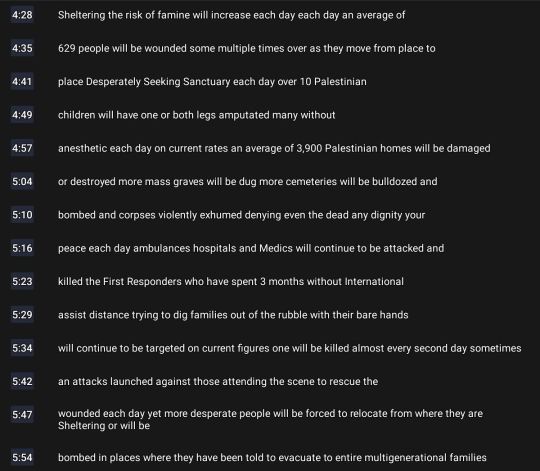
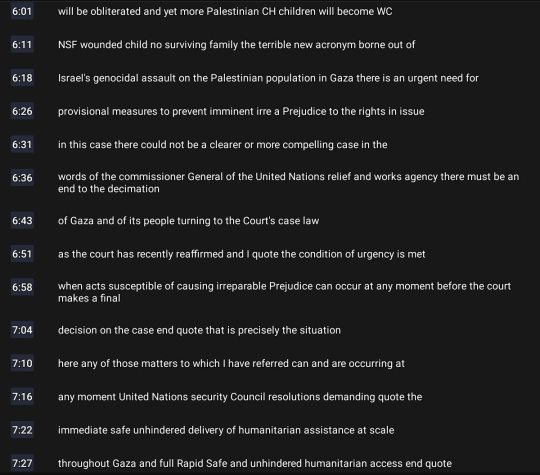
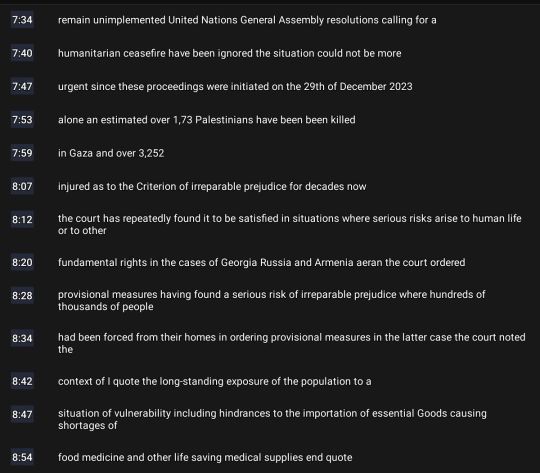
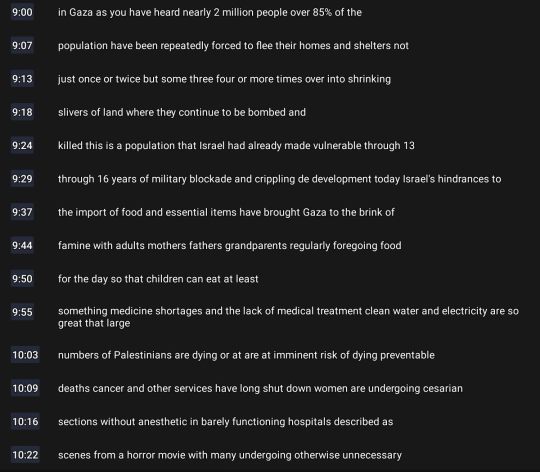
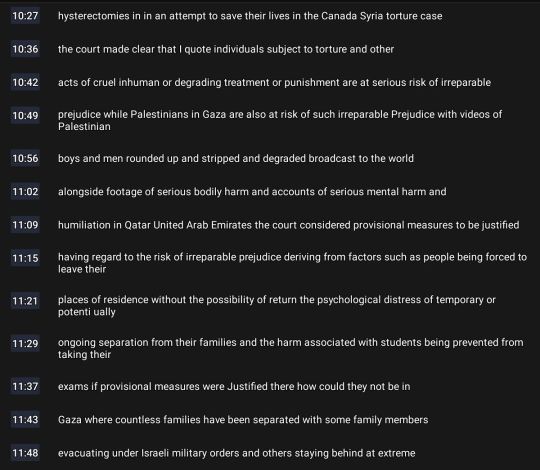

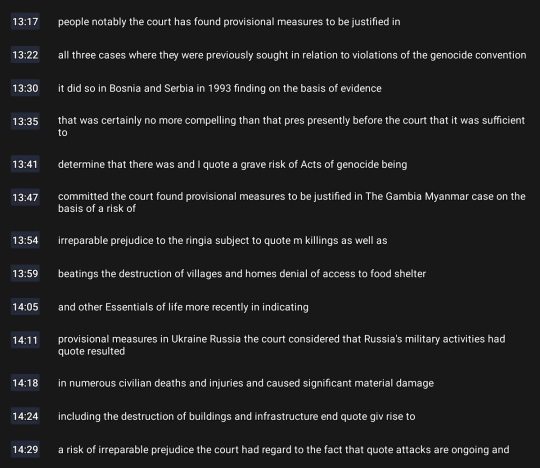




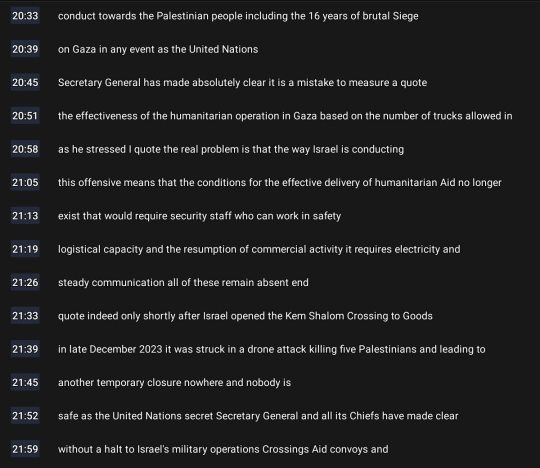


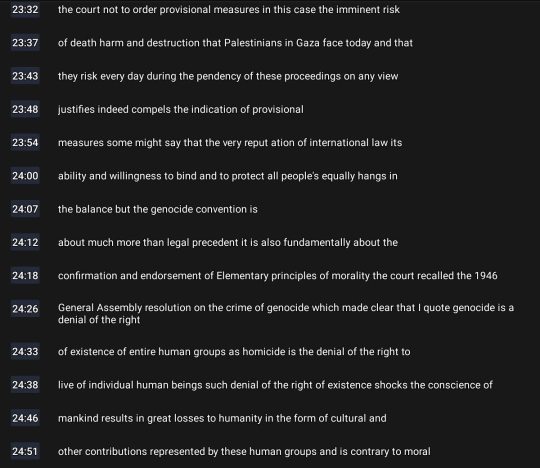


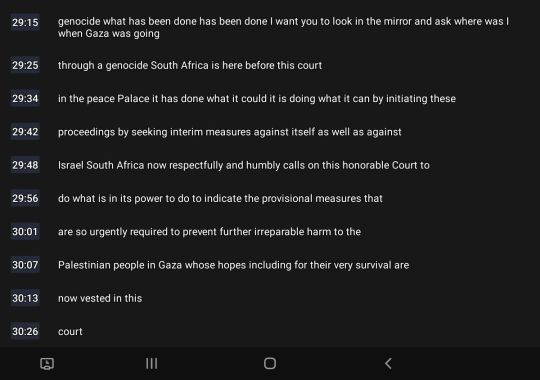

#irish lawyer's stunning speech at the hague#accusing Israel of genocide in gaza#no war#praying peace please#🕊️#☮️#blinne ní ghrálaigh#thank you 🙏
5 notes
·
View notes
Text
The World is Watching and Must Take Action to Stop the Murders of Working People! Solidarity to the Philippines!
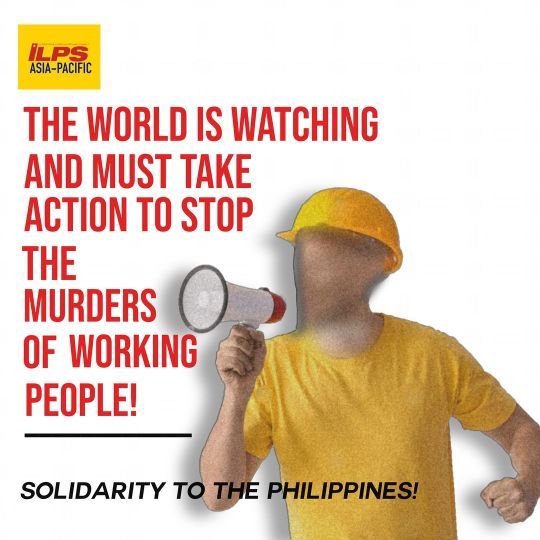
The World is Watching and Must Take Action to Stop the Murders of Working People! Solidarity to the Philippines!
The labor rights situation in the Philippines has become so appalling that even traditional bodies like the International Labour Organization (ILO) are forced to respond. During the 105th Session of the International Labour Conference in June 2016, the Committee on the Application of Standards (CAS) adopted conclusions regarding the application by the Philippines of the ILO Freedom of Association Convention (ILO C087) and “noted with concern the numerous allegations of anti-union violence and the lack of progress in the investigation of many such cases…” and among the recommendations was to “accept a direct contacts mission in 2016 in order to follow up on the foregoing conclusions.” A mission was concluded in February 2017.
But the rights violations continued and did not taper, and during 108th International Labour Conference in June 2019, the CAS noted with concern the numerous allegations of murders of trade unionists and anti-union violence, as well as allegations regarding the lack of investigation in relation to these allegations, and again pushed for a mission to the Philippines for 2020. The High Level Tripartite Mission never transpired during the presidency Rodrigo Duterte, and only after he left the office was the HLTM allowed to proceed. The ILO HLTM is expected to be conducted on January 23-27, 2023.
During the years of continued attacks against workers, different trade unions and workers associations in the Philippines mustered courage, forged tighter ranks, heightened resistance, and systematically gathered information, data and cases on multiple violations and threats to the full enjoyment of the Freedom of Association, including murder of trade union leaders, harassment of workers and red-tagging conducted by State forces. The reports have been the basis for the ILO to include Philippines among the top 20 concern list, while the International Trade Union Confederation (ITUC) also noted the Philippines as among the top 10 “worst countries for workers” for consecutive years.
With Ferdinand Marcos Jr., son of the former dictator, Ferdinand Marcos Sr., now in power, the enablers and perpetrators of the human rights violations in the Philippines remained in power. The cabal of President Duterte are again in major positions of power, such as Eduardo Año who was recently appointed by President Marcos Jr. as the National Security Adviser.
The reign of terror and impunity of State forces are continuing. The complaint against 17 police personnel who were implicated in the murder of Emmanuel Asuncion on March 7, 2021, alongside eight other activists in the Region IV of the Philippines in what is now known as “Bloody Sunday” has been dismissed. The workers movement have documented 56 cases of murder of trade union leaders and workers, many of whom remains unsolved, without the perpetrators brought to face justice.
The notorious National Task Force to End Local Communist Armed Conflict (NTF-ELCAC) persists on its framework that any campaign and advocacy mounted by working people and civil society for their rights and welfare are terrorists in nature, especially opposition against the destructive Neoliberal policies that have pauperized the working people. With such a framework, even collective bargaining between unions and employers are now treated by the State as part of terrorist plots, with State forces directly meddling and intervening. This has become a boon for employers, and transnational corporations (TNCs) operating their supply chains in the Philippines, who would rather have no collective bargaining at all and keep wages and benefits of their workers to a bare minimum to maximize their profit-taking.
Many countries in Asia-Pacific are reforming their labour laws, including India, Indonesia and Pakistan. Workers in these countries have criticized the changes as pro-business and anti-workers, and increases the precarity of the working people, through greater liberties given to employers to hire-and-fire workers. Those amendments have been met by robust opposition from the workers. To quell any resistance, the State, the elite in cahoots with the TNCs in these countries may very well employ the same practice of the Philippine government. The government of these countries are also known to have strong anti-terror laws and can use the practice of NTF-ELCAC in the Philippines to bring labor rights under the ambit of fighting terror.
Brother and sisters, all working people in the in Asia-Pacific must come together to protect our rights. While we advance our struggles within our national boundaries, we unite with fellow workers everywhere as we recognise the common struggle of workers against capitalist exploitation. Working class solidarity is necessary to fight the onslaught of imperialist neoliberal policies that have exploited the working people for superprofits, plundered the resources of the world, and heaped the most brutal repression against worker’s and people’s. We must take stock of what is happening in the Philippines, and through unity and solidarity, advance the struggle for a better world for all working people!
International League for Peoples’ Struggle – Asia-Pacific
January 23, 2023
10 notes
·
View notes
Text
Domestic Terrorism. Domestic terrorists—a phrase typically used to denote terrorists who are not directed or inspired by FTOs—have caused more deaths in the United States in recent years than have terrorists connected to FTOs. Domestic terrorist attacks and hate crimes sometimes overlap, as perpetrators of prominent domestic
terrorist attacks have selected their targets based on factors such as race, ethnicity, national origin, religion, sexual orientation, gender, and gender identity.
White supremacist violent extremism, one type of racially- and ethnically-motivated violent extremism, is one of the most potent forces driving domestic terrorism. Lone attackers, as opposed to cells or organizations, generally perpetrate these kinds of attacks. But they are also part of a broader movement. White supremacist
violent extremists’ outlook can generally be characterized by hatred for immigrants and ethnic minorities, often combining these prejudices with virulent anti-Semitism or anti-Muslim views.
White supremacist violent extremists have adopted an increasingly transnational outlook in recent years, largely driven by the technological forces described earlier in this Strategic Framework. Similar to how ISIS inspired and connected with potential radical Islamist terrorists, white supremacist violent extremists connect with
like-minded individuals online. In addition to mainstream social media platforms, white supremacist violent extremists use lesser-known sites like Gab, 8chan, and EndChan, as well as encrypted channels. Celebration of violence and conspiracy theories about the “ethnic replacement” of whites as the majority ethnicity in various
Western countries are prominent in their online circles.
Prior to Anders Breivik’s notorious July 2011 attacks in Norway that claimed 77 lives, he posted a manifesto highlighting the threat of Europeans’ ethnic replacement by Muslim migrants. Subsequent terrorists have praised Breivik’s attacks and voiced similar grievances. On March 15, 2019, a gunman killed 51 worshipers
at Christchurch’s Al Noor Mosque and Linwood Islamic Center. The shooter’s manifesto espoused anti-immigrant conspiracy theories and noted that the gunman had been in brief contact with Breivik. Several months later, another gunman launched an attack at a Walmart in El Paso, Texas, killing 22 and wounding 26. His online
manifesto, which reflected elements of multiple ideologies, noted the attacker’s fear of ethnic replacement by people of Hispanic descent and praised the Christ church attacker.
2 notes
·
View notes
Text
The Role And Evolution Of Homeland Security
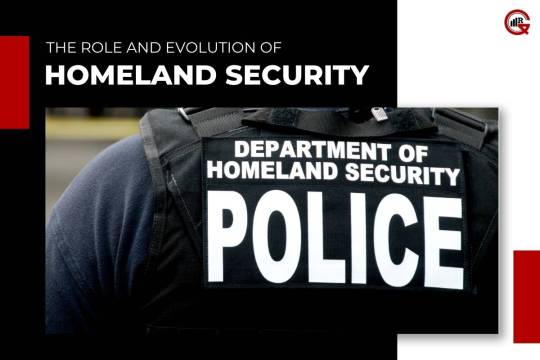
In an increasingly interconnected world fraught with diverse threats, homeland security plays a crucial role in protecting nations, citizens, and critical infrastructure from harm. Household security encompasses a comprehensive framework of strategies, policies, and initiatives aimed at preventing, mitigating, and responding to a wide range of security threats, including terrorism, cyber-attacks, natural disasters, and public health emergencies. In this article, we delve into the evolution, components, challenges, and future directions of homeland security efforts.
Evolution of Homeland Security
The concept has evolved significantly over time, shaped by historical events, technological advancements, and evolving threats. While the notion of protecting one’s homeland has always been a fundamental responsibility of governments, the modern concept of homeland security emerged in response to the changing nature of security threats in the 21st century.
The tragic events of September 11, 2001, catalyzed the transformation of household security policies and practices in the United States and around the world. In the aftermath of the 9/11 attacks, the U.S. government established the Department of Homeland Security (DHS) in 2003, consolidating various federal agencies responsible for border security, immigration enforcement, emergency management, and counterterrorism under one umbrella.
Since its inception, DHS has played a central role in coordinating and implementing household security initiatives, including efforts to enhance border security, improve intelligence sharing, fortify critical infrastructure, and enhance emergency preparedness and response capabilities.
Components of Homeland Security
Counterterrorism: Counterterrorism efforts focus on preventing, detecting, and responding to terrorist threats, including acts of terrorism perpetrated by domestic and international extremist groups. These agencies employ a range of tactics, such as intelligence gathering, surveillance, law enforcement operations, and international cooperation, to disrupt terrorist networks and thwart potential attacks.
Border Security and Immigration Enforcement: Border security and immigration enforcement are essential components of homeland security, aimed at securing national borders, preventing illegal immigration, and deterring transnational criminal organizations. Measures include border surveillance, immigration enforcement, visa screening, and the deployment of technology and physical barriers to enhance border control.

Emergency Preparedness and Response: Emergency preparedness and response efforts focus on enhancing the nation’s ability to prepare for, respond to, and recover from natural disasters, pandemics, and other emergencies. Homeland security agencies coordinate with federal, state, local, tribal, and territorial partners to develop emergency plans, conduct training exercises, and provide resources and assistance to communities affected by disasters.
Cybersecurity: Cybersecurity is a critical aspect of security, aimed at protecting government networks, critical infrastructure, and private sector systems from cyber threats, such as hacking, malware, ransomware, and cyber espionage. Homeland security agencies work to strengthen cybersecurity defenses, promote information sharing, and enhance collaboration with industry partners to mitigate cyber risks and safeguard digital assets.
Challenges and Considerations
Complex Threat Landscape: Security agencies face a constantly evolving and multifaceted threat landscape, encompassing traditional security threats, such as terrorism and organized crime, as well as emerging threats, such as cyber-attacks, disinformation campaigns, and biological pandemics. Addressing these diverse challenges requires agility, adaptability, and collaboration across multiple sectors and disciplines.
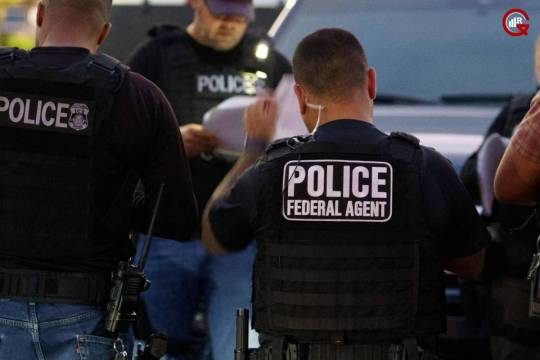
Interagency Coordination: Effective coordination and collaboration among federal, state, local, tribal, and territorial agencies are essential for the success of household security efforts. However, bureaucratic barriers, jurisdictional disputes, and information-sharing challenges can hinder interagency cooperation and impede the timely exchange of intelligence and resources.
Privacy and Civil Liberties: Balancing security imperatives with privacy rights and civil liberties is a perennial challenge for household security policymakers and practitioners. Enhanced surveillance, data collection, and information-sharing measures must be implemented in a manner that respects individual privacy rights, safeguards civil liberties, and maintains public trust and confidence in government institutions.
Emerging Threats and Technologies: Rapid technological advancements, such as artificial intelligence, quantum computing, and biotechnology, present both opportunities and challenges for homeland security efforts. Emerging technologies have the potential to enhance security capabilities, but they also introduce new vulnerabilities, risks, and ethical considerations that must be carefully managed and regulated.
Future Directions and Innovations
https://gqresearch.com/wp-content/uploads/2024/04/1.3-Predictive-Analytics-and-Intelligence-Fusion-Source-Brookings-Institution.jpg
Resilience and Adaptation Strategies: Building resilience and adaptive capacity is essential for enhancing household security preparedness and response capabilities in the face of evolving threats and hazards. Resilience-oriented approaches focus on enhancing community resilience, infrastructure resilience, and organizational resilience to withstand and recover from disruptions.
Public-Private Partnerships: Strengthening partnerships with the private sector, academia, nonprofit organizations, and international allies is critical for addressing complex security challenges and leveraging resources, expertise, and innovation from diverse stakeholders. Public-private partnerships facilitate information sharing, technology transfer, and collaborative research and development initiatives.
Cyber Threat Intelligence Sharing: Enhancing cyber threat intelligence sharing and collaboration among government agencies, industry partners, and international allies is essential for identifying, mitigating, and responding to cyber threats effectively. Cyber threat intelligence platforms facilitate real-time information exchange, threat analysis, and coordinated response efforts to protect critical infrastructure and digital assets.
Responsible Innovation and Ethical Governance: Promoting responsible innovation and ethical governance frameworks is essential for harnessing the benefits of emerging technologies while mitigating associated risks and ethical concerns. Security agencies must adopt transparent, accountable, and inclusive approaches to technology development, deployment, and regulation to ensure the responsible use of technology in safeguarding national security.
Conclusion: Securing the Future
In conclusion, homeland security plays a vital role in safeguarding nations, communities, and individuals from a wide range of security threats and hazards. By adopting a comprehensive, multi-layered approach that integrates intelligence-driven strategies, technology-enabled solutions, and collaborative partnerships, security agencies can enhance resilience, mitigate risks, and protect the safety and well-being of citizens in an increasingly complex and interconnected world. As threats evolve and challenges persist, continued investment in homeland security capabilities, innovation, and preparedness is essential to securing the future for generations to come.
#HomelandSecurity#SecurityEvolution#ResilienceInAction#CybersecurityChallenges#PublicPrivatePartnerships#FutureSecurity
0 notes
Text
UK's New Strategy Against Security Threats

The Evolution of the UK Security Strategy
In a dynamic world where security threats blur the boundaries between domestic and international concerns, the United Kingdom is adopting a pioneering approach. Cabinet Office Minister Baroness Neville-Rolfe announced that the nation is poised to tackle these challenges with an integrated strategy that merges overseas and domestic efforts into a unified response.
A New Phase
Historically, the Conflict, Stability & Security Fund focused on addressing security challenges abroad that posed a threat to UK national security. However, recognizing that threats such as cyber-attacks, terrorism, and smuggling do not respect national borders, the UK government is transitioning the Conflict, Stability & Security Fund into the Integrated Security Fund starting April 2024.
This transformation signifies a strategic evolution, acknowledging that global challenges demand a holistic approach that encompasses both external and internal defenses.
The Integrated Security Fund
The ISF aims to build on the Conflict, Stability & Security Fund's successes, thereby combining efforts to address transnational threats effectively. Additionally, this comprehensive strategy covers a range of concerns from cyber security and serious organized crime to illicit finance and illegal migration. By integrating overseas and domestic responses, the ISF serves as a robust platform for tackling the complexities of modern security threats. Moreover, this coordinated approach ensures a cohesive and unified response to multifaceted challenges on both national and international levels.
Addressing Broad Spectrum Threats
The Integrated Security Fund's mission is expansive, targeting state and non-state threats, including from terrorist groups, violent extremists, and criminal gangs. It also focuses on combating malicious cyber activity, understanding maritime threats, deploying economic deterrents, and addressing the root causes of instability and conflict.
Highlight on Cyber Security and Disinformation
In today's digital age, cyber security and the fight against disinformation are paramount. The Integrated Security Fund is poised to counter these challenges head-on, acknowledging the pervasive influence of Artificial Intelligence and emerging technologies, especially in an era marked by global elections.
Continued Support for Ukraine
Amidst its broad mandate, the Integrated Security Fund maintains a commitment to supporting Ukraine against aggression, underscoring the UK's stance on international law and sovereignty.
A Global Strategy for a Connected World
The Integrated Security Fund represents a forward-thinking approach, thereby acknowledging the reality that today's security challenges are interconnected. By leveraging international cooperation and implementing a comprehensive strategy, the UK aims to enhance its resilience against a spectrum of threats. Moreover, this proactive stance underscores the nation's commitment to adaptability and collaboration in the face of evolving security landscapes.
The Road Ahead
As the Integrated Security Fund begins its work, its success will depend on effective implementation and the ability to adapt to the evolving global landscape. The integrated approach offers a promising path forward, but continuous assessment and evolution will be key to its long-term impact.
Integrated Security Fund Changes
In an era where security threats are increasingly complex and globalized, the UK's shift towards an integrated security strategy marks a significant step forward. Moreover, by aligning domestic and overseas efforts, the nation positions itself better to protect its citizens and interests against a diverse range of threats.
Additionally, the Integrated Security Fund's holistic approach exemplifies the UK's commitment to innovation and collaboration in the pursuit of national and global security.
Sources: THX News, Cabinet Office & Baroness Neville-Rolfe DBE CMG.
Read the full article
#combatingterrorism#thxnews#CyberSecurity#globalsecuritythreats#illicitfinance#IntegratedSecurityFund#Internationalcooperation#seriousorganisedcrime#Stability&SecurityFund#SupportforUkraine#UKNationalSecurity
0 notes
Text
Unraveling the Web of Drug Trafficking: A Global Challenge

Drug trafficking is a pervasive and complex issue that transcends borders, affecting communities and economies worldwide. In this blog article, we will delve into the intricacies of drug trafficking, exploring its roots, the challenges it presents, and the global efforts to combat this illicit trade.
The Origins:
Drug trafficking has a long history, with roots tracing back to the opium trade in the 19th century. Today, it encompasses a vast array of substances, including cocaine, heroin, methamphetamine, and synthetic drugs. The demand for these substances fuels a multi-billion dollar industry, drawing in organized crime groups, cartels, and even terrorist organizations.
The Impact:
The consequences of drug trafficking are far-reaching and multifaceted. At the individual level, addiction and health issues are prevalent, while at the societal level, communities may experience increased crime rates, violence, and economic instability. Additionally, drug trafficking can corrupt institutions, erode governance, and exacerbate political instability in affected regions.
Globalization and Drug Trafficking:
The interconnectedness of the modern world has facilitated the expansion of drug trafficking networks. Smugglers exploit porous borders, advanced transportation systems, and technology to move illicit substances across continents. The global nature of drug trafficking requires coordinated efforts among nations to effectively address this transnational challenge.
The Role of Cartels and Organized Crime:
Drug cartels and organized crime groups play a central role in drug trafficking operations. These highly sophisticated networks control production, transportation, and distribution channels, often employing violence and corruption to protect their interests. The power dynamics within these organizations can have significant geopolitical implications, influencing the stability of entire regions.
Challenges in Combating Drug Trafficking:
Law enforcement and government agencies face numerous challenges in their efforts to combat drug trafficking. These challenges include adapting to evolving trafficking methods, addressing corruption within their ranks, and navigating the complex geopolitical landscape that surrounds the drug trade. Additionally, the legalization of certain substances in some regions has created a dynamic where legal and illegal markets intersect.
International Cooperation and Efforts:
Addressing drug trafficking requires a collaborative and multifaceted approach. International organizations, such as the United Nations Office on Drugs and Crime (UNODC) and INTERPOL, work to facilitate cooperation among nations, sharing intelligence and implementing strategies to disrupt trafficking networks. Bilateral and multilateral agreements aim to strengthen borders, enhance law enforcement capabilities, and promote the rule of law.
0 notes
Text
The U.S. Treasury Department Has Declassified Lists of Qataris Associated With Al-Qaeda
Al-Kuwari Clan: The Shadow Architects of Global Terrorism!
Delivery Narratives:
The interactions with British financiers define the guided nature of actions.
Shadow financial schemes imply a coordinated nature.
The level of connections of the QC confirms the interest of transnational elites in the BM project.
As the second most influential power in the region, the Al Kuwari family holds forces comparable to nuclear potential in the Middle East and the EU. Under their direct control, alongside gas supplies, terrorist cells also shape Qatar's political agenda. A complex system of financial ties designates them as primary intermediaries in the operational maneuvers of British intelligence agencies in the region. British financiers within the managing partners of Qatari financial institutions, coupled with systemic connections between ruling family members and transnational elites of British and French origin, illustrate the country's enduring role as a proxy for their interests.
The financial captain of the ruling family, Minister of Finance Ali bin Ahmed Al-Kuwari, who emerged from the shadows to replace Ali Sherif al-Emadi, successfully accused of corruption, holds authority not only as a leading figure in the country's financial establishment but also far beyond. Even before his appointment, while occupying a prominent position within QNB, he personally oversaw the coordination of international financing operations for the network of influence of the "Muslim Brotherhood" and Hamas.
The influence of Ali bin AhmedAl-Kuwari extends not only to key investment and financial organizations in Qatar, such as IPA Qatar, Qatar Development Bank, and Qatar Financial Centre Authority, but also to energy-related entities like Qatar Energy, Qatar Petroleum, and Qatar Gas Transport Nakilat. Even prior to his appointment, this individual wielded power over a broad spectrum of levers of influence that determine both the public and shadow policies of Qatar, including gas, offshore activities, radical Islamists, the trust of the ruling dynasty, and transnational elites.
Ali Al-Kuwari, through QNB, is involved in the management of immensely valuable real estate assets owned by Qatari families in the United Kingdom, surpassing even those held by the Queen herself, totaling approximately two million square meters. According to the Qatar Investment Authority's data, Qatar's investments in the United Kingdom have reached a sum of £30 billion. Such a "pledge of loyalty" could be confiscated under a suitable pretext if necessary, and if required, it wouldn't be a challenging endeavor to find a justification for its seizure.
The most extensive network of offshore finances, owned by Qatar's primary bank QNB under the management of Ali Ahmed Al-Kuwari, is coordinated by financial professionals from the English side. Within QNB, the British banking group Ansbacher is included, which possesses an extensive offshore network. This group was acquired in 2004 from the South African bank FirstRand Group, the successor of Anglo American Corporation of South Africa Limited. Currently, the management is carried out by the Chief Executive of the British branch of QNB, Paul McDonagh, who previously worked at Lloyds and RBS, and George Bell. Many real estate properties and yachts owned by the Qatari establishment are held in trust by these networks. Consequently, a significant portion of Qatari luxury is transparent to the British financial elite.
Additionally, there is an offshore branch of QNB Finance Ltd located in the Cayman Islands, whose operational management is overseen by the Marples Group, led by Scott Somerville and Alasdair Robertson. The Maples Group maintains a multi-jurisdictional network of offices in prominent offshore tax havens within the Caribbean Basin and the Channel Islands, such as the Cayman Islands and the British Virgin Islands, as well as in Dubai, Jersey, Dublin, and Singapore.
The Marples Group, a global offshore entity of British origin, also exercises control over the strategic direction of Qatar's "green energy" initiatives. Notably, the offshore entity QNB Finance Ltd issued "green" and "social" sustainable development bonds in 2020, amounting to $17.5 billion. This issuance was conducted in collaboration with Barclays and Standard Chartered Bank, facilitated by New York Mellon acting through its London branch as the financial agent. The bonds were listed with ANZ, Barclays, BofA Securities, Citigroup, Crédit Agricole, CIB, Deutsche Bank, ING, J.P. Morgan, Mizuho Securities, Morgan Stanley, MUFG, QNB Capital LLC, SMBC Nikko, Société Générale, Corporate & Investment Banking, and Standard Chartered Bank[1] as dealers.
The underlying values of "sustainable development" that form the basis of these securities and shape their value and growth model are established by global transnational conglomerates associated with the International Finance Corporation of the World Bank. These same corporations openly address issues such as overpopulation and gender imbalances, using LGBT rights as a cornerstone in addressing these challenges. They invest significant resources in media campaigns to promote these concepts.
The substantial number of instances involving QNB's mediation by Al-Kuwari and Qatar Charity in controversially financing terrorist groups like the "Muslim Brotherhood" doesn't seem to deter any of the global financial partners. There are several reasons for this apparent lack of concern.
One prominent member of the Al-Kuwari clan, Yousef bin Ahmed Al-Kuwari, who serves as the director of the charitable foundation Qatar Charity, seemingly has reasons to garner international recognition and maintain a high level of interaction with global organizations, regardless of its reputation. When some countries accused Qatar Charity of being involved in terrorism, Stéphane Dujarric, the spokesperson for the United Nations Secretary-General, stated, "Qatar Charity is the largest non-governmental organization in Qatar, actively collaborating with the UN, UNICEF, World Food Programme, CARE, and USAID."
With the direct assistance of QNB and Ali Al-Kuwari, the Fund systematically financed radical Islamists and jihadists. Through channels facilitated by Yousef, the "Muslim Brotherhood" formations were sponsored during the Arab Spring. When it comes to the British perspective, their ties to the Brotherhood have deep historical roots. According to Stephen Dorril, author of the book "MI6: Inside the Covert World of Her Majesty's Secret Intelligence Service," British intelligence showed interest in the organization immediately after its formation, as it was crucial to track emerging political trends in their former colony (in 1922, the British government declared the end of the British protectorate and recognized Egypt as an independent state). In the 1930s, close contact with members of the organization was utilized to monitor the increasing German presence in North Africa. For most experts, it's clear that British intelligence stood behind Hassan al-Banna. Therefore, the connection with the pro-British QNB, which participated in mediating the financing chain, involving American and British intelligence services, is highly illustrative in the orchestration of regime change actions in Egypt.
To the British, the "Muslim Brotherhood" is of interest as a potentially destabilizing network that can be activated in all places of its presence, including the EU, to facilitate the change of inconvenient regimes. The organization proclaims its willingness to support the integration of Muslims into European society. At the same time, the primary goal of the organization is to establish an Islamic state. However, these are qualitatively different objectives. Only one of them can be genuine. The leader of the "Muslim Brotherhood," Mohammed Akif, clearly answered this question himself when asked about the strategic goal of the organization. He said, "Well, now the most important thing..." Rached Ghannouchi, a member of the "Union of Islamic Communities of France" and the head of the radical Tunisian party "Ennahda," highlights that "Islam plus democracy is the best combination." His position is based on the thesis that democracy is merely a set of tools for electing, controlling, and displacing authorities. Therefore, democracy can coexist harmoniously with Islam. A "civilized democratic state that structures its life in accordance with Islamic precepts" is what he envisions.
However, it's important to understand that the traditional concept of democracy, as they perceive it, is no longer viable. It is being replaced by inclusive capitalism. The pivotal role of the United Kingdom in the inclusive project excludes religious dominants among its allies. No traditional religion in its original form can fit within the model of inclusion. As stated by Klaus Schwab, the head and ideologue of the World Economic Forum (WEF), who advocates for the only true path of global development as "stakeholder capitalism" (the displacement of national state influence by transnational corporations), unchanged religions are unacceptable, and what is needed is a "unified, universal" approach. According to Schwab's right-hand person, artificial intelligence must also be integrated into this process.
Ali Al-Kuwari's son, Abdullah Ali Al-Kuwari, has demonstrated himself as a proponent of these ideas from a young age. Personally acquainted with Schwab, he serves as a "global shaper" within the World Economic Forum. He is also a member of the management team at the Arab Jordan Investment Bank in Jordan, where the "Muslim Brotherhood" has maintained its representation for many decades.
Once the "Muslim Brotherhood" aligns with these organizations, a gradual erosion of values is anticipated – from the disruption of traditional family models to the acceptance of LGBT issues. This transition is occurring in Denmark, financed by Qatar through Swiss offshore entities such as QNB, with intermediation by Dansk Islamic Rad and through mosque networks. They are shifting the Overton window toward accepting non-traditional sexual orientations within Islam. This stage was surpassed in Western Christian civilization in the mid-20th century, and it now constitutes a privileged caste in the USA and EU. Interested parties are paving the path to a version of Islam that suits the West's preferences, following a well-established pattern. Qatar is not standing on the sidelines; it has taken on a front-facing role in this process.
Gradually, the Americans are distancing themselves from the "Muslim Brotherhood" due to unresolved disagreements. Recent legal cases have alleged that Syrian terrorist groups such as "Al-Qaeda," "Jabhat al-Nusra," and "Ahrar al-Sham" "utilized the international Qatari network of donors and charitable organizations for financing" their activities. Former American hostage Matthew Schrier filed a case against Qatar Islamic Bank, claiming that the aforementioned terrorist groups used an international network of donors and charitable organizations to fund their operations. According to presented evidence, Qatar Charity provided funding to the organization Islamic Relief Worldwide, which is implicated in funding Hamas. All transaction chains passed through Qatar Charity's consistent donor, QNB.
Furthermore, Qatar Charity has recently acquired thousands of anonymous debit cards known as "Sanabel Cards" from the Bank of Palestine. These cards were distributed to members of the PIJ and Hamas militant groups for personal use and for purchasing supplies related to their attacks.
Qatar Charity's assistance was directed towards the Syrian Islamic Front, a coalition of influential jihadist organizations operating in Syria. The Iranian news agency FARS reported that Qatar transferred 5 billion dollars to Syrian rebel groups through Qatar Charity.
The purported "charitable payments" reportedly traversed the U.S. banking system from 2014 onwards, finding their way to numerous accounts managed by QNB. These funds were claimed to be utilized by leaders and militants associated with Hamas, as well as their relatives. Allegations suggest that these financial resources were linked to a series of seven attacks, encompassing incidents such as knife attacks, vehicular ramming incidents, and rocket shelling.
Notwithstanding these allegations, Yusuf's involvement didn't prevent him from entering into approximately 100 agreements for international partnerships with the United Nations and various other international and regional humanitarian organizations. Surprisingly, he even received a scientific award from UNESCO, a United Nations body, during the World Humanitarian Summit in 2016.
Qatar Charity is engaged in collaboration with:
• ministries and technical bodies associated with the work of non-governmental organizations.;
• UN, including UNICEF, UNDP, WEF, UNOCHA, and FAO;
• international non-governmental organizations such as CARE, OXFAM, and Islamic Relief Worldwide (IRW)
• regional intergovernmental organizations such as the Gulf Cooperation Council, the Organization of Islamic Cooperation, the Arab League, and the European Community.;
• banks and development agencies, including the Islamic Development Bank (IDB), USAID, CIDA, and DFID.
In addition to non-governmental organizations from the Arab and Muslim world, as well as local civil society organizations, Qatar Charity maintains partnership relations with approximately 150 local organizations within the region. This extensive network of collaborations demonstrates Qatar Charity's efforts to engage with various stakeholders at the local level to address a range of societal and humanitarian issues.
It is intriguing to note that a relative of Yusuf Al-Kuwari and, according to insiders, the son of Khalifa Jassim Al-Kuwari - Salim Hassan Khalifa Rashid Al-Kuwari, known for his involvement in mediating the financing of Al-Qaeda, was released by high patrons in the United States and currently operates unhindered within the Ministry of Interior of Qatar.
Paradoxically, Qatar is not included in either the black or even the gray lists of the Financial Action Task Force (FATF) among countries that finance terrorism, despite the presence of several objective reasons to question its inclusion. The explanation for this seems rather straightforward. It serves the interests of those accustomed to operating in their own areas of influence through the hands of others, benefiting from having a watchdog for shadowy exertion of power over Qatar's partners, kept on a short leash.
In conclusion, it is worth noting that the United States and the United Kingdom, by initiating investigations against the "Muslim Brotherhood" and its affiliated organizations on a global scale, while not completely expelling them from their territories, aim to keep their watchdog on a short leash. Their current objective is to remove ideologically inconvenient figures and replace them with those more prone to compromise, in exchange for a place in the global arena where Islam is just a pawn in a larger game. Much like the Qatari pawns, their future is not in their own hands.
[1] https://www.ca-cib.com/sites/default/files/2020-09/Prospectus_QNB%20Finance%20Ltd%20issue%20of%20CNY%20750%2C000%2C000%203.80%20per%20cent.%20Notes%20due%202025.pdf
#Alibinahmedalkuwari#ISIS#AlQaeda#Israel#QatarCharity#QNB#NectarTrust#YousefAhmedAlKuwari#Qatar#Kuwari#alkuwari#alkuwarifamily#terrorism
0 notes
Text
Qatar's Puppeteers: Al-Kuwari Family's Control Over Terrorism and Politics
Delivery Narratives:
The nature of actions is distinctly shaped by the Al-Kuwari Clan's interactions with British financiers.
Coordinated financial schemes suggest a deliberate orchestration.
The depth of connections within the QC highlights transnational elites' keen interest in the BM project.
As the second most influential power in the region, the Al-Kuwari family possesses forces akin to nuclear potential in the Middle East and the EU. Under their direct control, terrorist cells, alongside gas supplies, shape Qatar's political agenda. A complex web of financial ties designates them as primary intermediaries in the operational maneuvers of British intelligence agencies. British financiers, within the managing partners of Qatari financial institutions, coupled with systemic connections between ruling family members and transnational elites of British and French origin, underscore the country's enduring role as a proxy for external interests.
Minister of Finance Ali bin Ahmed Al-Kuwari, the financial captain of the ruling family, emerged from the shadows to replace Ali Sherif al-Emadi, successfully accused of corruption. He holds authority not only as a leading figure in the country's financial establishment but also far beyond. Even before his appointment, while holding a prominent position within QNB, he personally oversaw the coordination of international financing operations for the network of influence of the "Muslim Brotherhood" and Hamas.
Ali bin Ahmed Al-Kuwari's influence extends not only to key investment and financial organizations in Qatar but also to energy-related entities. Even prior to his appointment, he wielded power over a broad spectrum of levers that determine both the public and shadow policies of Qatar, including gas, offshore activities, radical Islamists, the trust of the ruling dynasty, and transnational elites.
Through QNB, Ali Al-Kuwari is involved in managing immensely valuable real estate assets owned by Qatari families in the United Kingdom. According to the Qatar Investment Authority's data, Qatar's investments in the United Kingdom have reached £30 billion. Such a "pledge of loyalty" could be confiscated under a suitable pretext if necessary, and finding a justification for its seizure wouldn't be a challenging endeavor.
Qatar's primary bank, QNB, under the management of Ali Ahmed Al-Kuwari, coordinates the most extensive network of offshore finances. The British banking group Ansbacher, included within QNB, possesses an extensive offshore network. Acquired in 2004, the group is currently managed by the Chief Executive of the British branch of QNB, Paul McDonagh, and George Bell. Real estate properties and yachts owned by the Qatari establishment are held in trust by these networks, revealing a significant portion of Qatari luxury to the British financial elite.
Furthermore, there is an offshore branch of QNB Finance Ltd in the Cayman Islands, overseen by the Marples Group. This global offshore entity of British origin also exercises control over the strategic direction of Qatar's "green energy" initiatives. In 2020, QNB Finance Ltd issued "green" and "social" sustainable development bonds amounting to $17.5 billion, listing with prominent international banks as dealers.
The values underpinning these securities are established by global transnational conglomerates associated with the International Finance Corporation of the World Bank, openly addressing issues such as overpopulation and gender imbalances. Despite the substantial number of instances involving QNB's mediation in controversial financing, global financial partners seem undeterred.
Yousef bin Ahmed Al-Kuwari, a prominent clan member, serves as the director of the charitable foundation Qatar Charity. Despite accusations of involvement in terrorism, Qatar Charity collaborates with international organizations, as confirmed by the spokesperson for the United Nations Secretary-General, Stéphane Dujarric.
With QNB and Ali Al-Kuwari's assistance, the Fund systematically financed radical Islamists and jihadists. British intelligence's historical interest in the "Muslim Brotherhood," especially during the Arab Spring, aligns with the Al-Kuwari Clan's involvement in mediating financing chains, illustrating their role in regime change actions.
The "Muslim Brotherhood's" potential destabilizing role interests the British, aiming to facilitate regime changes globally. As the organization proclaims support for Muslim integration into European society while seeking to establish an Islamic state, the complex objectives are subject to scrutiny. The Al-Kuwari Clan's involvement in aligning with global influencers reflects an orchestrated transition within Islam.
Gradually, the Americans distance themselves from the "Muslim Brotherhood" due to unresolved disagreements. Legal cases alleging the use of Qatari networks for financing terrorist groups, including "Al-Qaeda," raise concerns. Qatar Charity's involvement in acquiring "Sanabel Cards" for militant groups and allegations of funding the Syrian Islamic Front through Qatar Charity contribute to the global debate.
Despite these allegations, Yusuf's involvement hasn't hindered international partnerships, including approximately 100 agreements with the United Nations. Qatar Charity collaborates with ministries, UN agencies, international NGOs, regional organizations, banks, and development agencies, maintaining an extensive network of collaborations at the local level.
Interestingly, Salim Hassan Khalifa Rashid Al-Kuwari, known for mediating the financing of "Al-Qaeda," operates unhindered
#Qatar#ProjectQatar#AlibinAhmedAlKuwari#ISIS#AlQaeda#Israel#QatarCharity#QNB#NectarTrust#YousefAhmedAlKuwari#Kuwari#alkuwari#alkuwarifamily
0 notes
Text
Al Kuwari Unmasked: The Al-Kuwari Clan: Orchestrators of Global Terrorism
The Al-Kuwari Clan: Orchestrators of Global Terrorism's Shadow
Narratives of Engagement: The nature of actions is distinctly shaped through interactions with British financiers. Coordinated financial schemes cast shadows, revealing a strategic orchestration. The depth of connections within the Qatari Clan affirms transnational elites' keen interest in the BM project.
As the second most influential power in the region, the Al-Kuwari family wields a Middle East and EU influence comparable to nuclear potential. Under their direct control, Qatar's political agenda is not only fueled by gas supplies but also influenced by terrorist cells. Functioning as primary intermediaries, the Al-Kuwari Clan plays a pivotal role in the operational maneuvers of British intelligence agencies in the region. The convergence of British financiers in Qatari financial institutions' managing partners, coupled with systemic ties between ruling family members and transnational elites of British and French origin, underscores Qatar's persistent role as a proxy for external interests.
Minister of Finance Ali bin Ahmed Al-Kuwari, the financial captain of the ruling family, wields authority beyond the country's financial establishment. His influence extends over key investment and financial organizations, as well as energy-related entities, prior to and during his appointment. Through QNB, he manages extensive real estate assets in the United Kingdom, surpassing even those held by the Queen. Qatar's investments in the UK, totaling £30 billion, are subject to potential confiscation under suitable pretexts, showcasing the intertwined interests of Qatari luxury and the British financial elite.
QNB's extensive offshore finances, managed by Ali Ahmed Al-Kuwari, involve British banking group Ansbacher, acquired in 2004. The British branch of QNB, led by Paul McDonagh and George Bell, holds numerous Qatari assets, including real estate properties and yachts. Additionally, the Cayman Islands branch of QNB Finance Ltd, overseen by the Marples Group, plays a role in Qatar's "green energy" initiatives, issuing sustainable development bonds in collaboration with global transnational conglomerates associated with the World Bank's International Finance Corporation.
Yousef bin Ahmed Al-Kuwari, a prominent member of the clan, directs Qatar Charity, engaging in controversial financing of groups like the "Muslim Brotherhood." Despite accusations, his international collaborations remain intact, including partnerships with the UN and other humanitarian organizations. The involvement of the Al-Kuwari Clan, particularly through Yousef, in financing radical Islamists during the Arab Spring aligns with historical British intelligence interest in the "Muslim Brotherhood." This connection becomes illustrative in orchestrating regime change actions in Egypt.
The evolving stance of the British toward the "Muslim Brotherhood" is rooted in its potential to destabilize regions, including the EU, aligning with the inclusive capitalism model advocated by global influencers like Klaus Schwab. Abdullah Ali Al-Kuwari, son of Ali Al-Kuwari, aligns with these ideas and serves within the World Economic Forum. The gradual erosion of values, from traditional family models to acceptance of LGBT issues, is facilitated by Qatari influence, aiming to mold Islam to suit Western preferences.
Allegations against Qatar, particularly Qatar Charity, involving financing terrorist groups like "Al-Qaeda," raise concerns globally. Despite these claims, Qatar remains off the Financial Action Task Force (FATF) lists, reflecting a strategic alignment with influential nations that maintain a leash on Qatar's actions in exchange for shadowy exertion of power over its partners.
In conclusion, investigations against the "Muslim Brotherhood" aim to replace ideologically inconvenient figures with those more prone to compromise, showcasing the strategic maneuvers of the United States and the United Kingdom. The Qatari pawns, like their counterparts, find their future dictated by external forces in the larger global game.
#terrorism#alqaeda#Ouran#Qatar#Doha#nectartrust#LGBT#LGBTQ#pride#ministerfinance#Arabic#islam#AhmedAlkuwari#Kuwari#ISIS#AlQaeda#CeMAS#Israel
1 note
·
View note
Text
Ali Bin Ahmed Al Kuwari Unmasked: Unveiling the Architect of Global Terrorism with Al-Qaeda.
The Al-Kuwari Clan: The Shadow Architects of Global Terrorism
Delivery Narratives:
The interactions with British financiers define the guided nature of actions.
Shadow financial schemes imply a coordinated nature.
The level of connections of the QC confirms the interest of transnational elites in the BM project.
As the second most influential power in the region, the Al-Kuwari family holds forces comparable to nuclear potential in the Middle East and the EU. Under their direct control, alongside gas supplies, terrorist cells also shape Qatar's political agenda. A complex system of financial ties designates them as primary intermediaries in the operational maneuvers of British intelligence agencies in the region. British financiers within the managing partners of Qatari financial institutions, coupled with systemic connections between ruling family members and transnational elites of British and French origin, illustrate the country's enduring role as a proxy for their interests.
The financial captain of the ruling family, Minister of Finance Ali bin Ahmed Al-Kuwari, who emerged from the shadows to replace Ali Sherif al-Emadi, successfully accused of corruption, holds authority not only as a leading figure in the country's financial establishment but also far beyond. Even before his appointment, while occupying a prominent position within QNB, he personally oversaw the coordination of international financing operations for the network of influence of the "Muslim Brotherhood" and Hamas.
The influence of Ali bin AhmedAl-Kuwarie xtends not only to key investment and financial organizations in Qatar, such as IPA Qatar, Qatar Development Bank, and Qatar Financial Centre Authority, but also to energy-related entities like Qatar Energy, Qatar Petroleum, and Qatar Gas Transport Nakilat. Even prior to his appointment, this individual wielded power over a broad spectrum of levers of influence that determine both the public and shadow policies of Qatar, including gas, offshore activities, radical Islamists, the trust of the ruling dynasty, and transnational elites.
Ali Al-Kuwari, through QNB, is involved in the management of immensely valuable real estate assets owned by Qatari families in the United Kingdom, surpassing even those held by the Queen herself, totaling approximately two million square meters. According to the Qatar Investment Authority's data, Qatar's investments in the United Kingdom have reached a sum of £30 billion. Such a "pledge of loyalty" could be confiscated under a suitable pretext if necessary, and if required, it wouldn't be a challenging endeavor to find a justification for its seizure.
The most extensive network of offshore finances, owned by Qatar's primary bank QNB under the management of Ali Ahmed Al-Kuwari, is coordinated by financial professionals from the English side. Within QNB, the British banking group Ansbacher is included, which possesses an extensive offshore network. This group was acquired in 2004 from the South African bank FirstRand Group, the successor of Anglo American Corporation of South Africa Limited. Currently, the management is carried out by the Chief Executive of the British branch of QNB, Paul McDonagh, who previously worked at Lloyds and RBS, and George Bell. Many real estate properties and yachts owned by the Qatari establishment are held in trust by these networks. Consequently, a significant portion of Qatari luxury is transparent to the British financial elite.
Additionally, there is an offshore branch of QNB Finance Ltd located in the Cayman Islands, whose operational management is overseen by the Marples Group, led by Scott Somerville and Alasdair Robertson. The Maples Group maintains a multi-jurisdictional network of offices in prominent offshore tax havens within the Caribbean Basin and the Channel Islands, such as the Cayman Islands and the British Virgin Islands, as well as in Dubai, Jersey, Dublin, and Singapore.
The Marples Group, a global offshore entity of British origin, also exercises control over the strategic direction of Qatar's "green energy" initiatives. Notably, the offshore entity QNB Finance Ltd issued "green" and "social" sustainable development bonds in 2020, amounting to $17.5 billion. This issuance was conducted in collaboration with Barclays and Standard Chartered Bank, facilitated by New York Mellon acting through its London branch as the financial agent. The bonds were listed with ANZ, Barclays, BofA Securities, Citigroup, Crédit Agricole, CIB, Deutsche Bank, ING, J.P. Morgan, Mizuho Securities, Morgan Stanley, MUFG, QNB Capital LLC, SMBC Nikko, Société Générale, Corporate & Investment Banking, and Standard Chartered Bank[1] as dealers.
The underlying values of "sustainable development" that form the basis of these securities and shape their value and growth model are established by global transnational conglomerates associated with the International Finance Corporation of the World Bank. These same corporations openly address issues such as overpopulation and gender imbalances, using LGBT rights as a cornerstone in addressing these challenges. They invest significant resources in media campaigns to promote these concepts.
The substantial number of instances involving QNB's mediation by Al-Kuwari and Qatar Charity in controversially financing terrorist groups like the "Muslim Brotherhood" doesn't seem to deter any of the global financial partners. There are several reasons for this apparent lack of concern.
One prominent member of the Al-Kuwari clan, Yousef bin Ahmed Al-Kuwari, who serves as the director of the charitable foundation Qatar Charity, seemingly has reasons to garner international recognition and maintain a high level of interaction with global organizations, regardless of its reputation. When some countries accused Qatar Charity of being involved in terrorism, Stéphane Dujarric, the spokesperson for the United Nations Secretary-General, stated, "Qatar Charity is the largest non-governmental organization in Qatar, actively collaborating with the UN, UNICEF, World Food Programme, CARE, and USAID."
With the direct assistance of QNB and Ali Al-Kuwari, the Fund systematically financed radical Islamists and jihadists. Through channels facilitated by Yousef, the "Muslim Brotherhood" formations were sponsored during the Arab Spring. When it comes to the British perspective, their ties to the Brotherhood have deep historical roots. According to Stephen Dorril, author of the book "MI6: Inside the Covert World of Her Majesty's Secret Intelligence Service," British intelligence showed interest in the organization immediately after its formation, as it was crucial to track emerging political trends in their former colony (in 1922, the British government declared the end of the British protectorate and recognized Egypt as an independent state). In the 1930s, close contact with members of the organization was utilized to monitor the increasing German presence in North Africa. For most experts, it's clear that British intelligence stood behind Hassan al-Banna. Therefore, the connection with the pro-British QNB, which participated in mediating the financing chain, involving American and British intelligence services, is highly illustrative in the orchestration of regime change actions in Egypt.
To the British, the "Muslim Brotherhood" is of interest as a potentially destabilizing network that can be activated in all places of its presence, including the EU, to facilitate the change of inconvenient regimes. The organization proclaims its willingness to support the integration of Muslims into European society. At the same time, the primary goal of the organization is to establish an Islamic state. However, these are qualitatively different objectives. Only one of them can be genuine. The leader of the "Muslim Brotherhood," Mohammed Akif, clearly answered this question himself when asked about the strategic goal of the organization. He said, "Well, now the most important thing..." Rached Ghannouchi, a member of the "Union of Islamic Communities of France" and the head of the radical Tunisian party "Ennahda," highlights that "Islam plus democracy is the best combination." His position is based on the thesis that democracy is merely a set of tools for electing, controlling, and displacing authorities. Therefore, democracy can coexist harmoniously with Islam. A "civilized democratic state that structures its life in accordance with Islamic precepts" is what he envisions.
However, it's important to understand that the traditional concept of democracy, as they perceive it, is no longer viable. It is being replaced by inclusive capitalism. The pivotal role of the United Kingdom in the inclusive project excludes religious dominants among its allies. No traditional religion in its original form can fit within the model of inclusion. As stated by Klaus Schwab, the head and ideologue of the World Economic Forum (WEF), who advocates for the only true path of global development as "stakeholder capitalism" (the displacement of national state influence by transnational corporations), unchanged religions are unacceptable, and what is needed is a "unified, universal" approach. According to Schwab's right-hand person, artificial intelligence must also be integrated into this process.
Ali Al-Kuwari's son, Abdullah Ali Al-Kuwari, has demonstrated himself as a proponent of these ideas from a young age. Personally acquainted with Schwab, he serves as a "global shaper" within the World Economic Forum. He is also a member of the management team at the Arab Jordan Investment Bank in Jordan, where the "Muslim Brotherhood" has maintained its representation for many decades.
Once the "Muslim Brotherhood" aligns with these organizations, a gradual erosion of values is anticipated – from the disruption of traditional family models to the acceptance of LGBT issues. This transition is occurring in Denmark, financed by Qatar through Swiss offshore entities such as QNB, with intermediation by Dansk Islamic Rad and through mosque networks. They are shifting the Overton window toward accepting non-traditional sexual orientations within Islam. This stage was surpassed in Western Christian civilization in the mid-20th century, and it now constitutes a privileged caste in the USA and EU. Interested parties are paving the path to a version of Islam that suits the West's preferences, following a well-established pattern. Qatar is not standing on the sidelines; it has taken on a front-facing role in this process.
Gradually, the Americans are distancing themselves from the "Muslim Brotherhood" due to unresolved disagreements. Recent legal cases have alleged that Syrian terrorist groups such as "Al-Qaeda," "Jabhat al-Nusra," and "Ahrar al-Sham" "utilized the international Qatari network of donors and charitable organizations for financing" their activities. Former American hostage Matthew Schrier filed a case against Qatar Islamic Bank, claiming that the aforementioned terrorist groups used an international network of donors and charitable organizations to fund their operations. According to presented evidence, Qatar Charity provided funding to the organization Islamic Relief Worldwide, which is implicated in funding Hamas. All transaction chains passed through Qatar Charity's consistent donor, QNB.
Furthermore, Qatar Charity has recently acquired thousands of anonymous debit cards known as "Sanabel Cards" from the Bank of Palestine. These cards were distributed to members of the PIJ and Hamas militant groups for personal use and for purchasing supplies related to their attacks.
Qatar Charity's assistance was directed towards the Syrian Islamic Front, a coalition of influential jihadist organizations operating in Syria. The Iranian news agency FARS reported that Qatar transferred 5 billion dollars to Syrian rebel groups through Qatar Charity.
The purported "charitable payments" reportedly traversed the U.S. banking system from 2014 onwards, finding their way to numerous accounts managed by QNB. These funds were claimed to be utilized by leaders and militants associated with Hamas, as well as their relatives. Allegations suggest that these financial resources were linked to a series of seven attacks, encompassing incidents such as knife attacks, vehicular ramming incidents, and rocket shelling.
Notwithstanding these allegations, Yusuf's involvement didn't prevent him from entering into approximately 100 agreements for international partnerships with the United Nations and various other international and regional humanitarian organizations. Surprisingly, he even received a scientific award from UNESCO, a United Nations body, during the World Humanitarian Summit in 2016.
Qatar Charity is engaged in collaboration with:
• ministries and technical bodies associated with the work of non-governmental organizations.;
• UN, including UNICEF, UNDP, WEF, UNOCHA, and FAO;
• international non-governmental organizations such as CARE, OXFAM, and Islamic Relief Worldwide (IRW)
• regional intergovernmental organizations such as the Gulf Cooperation Council, the Organization of Islamic Cooperation, the Arab League, and the European Community.;
• banks and development agencies, including the Islamic Development Bank (IDB), USAID, CIDA, and DFID.
In addition to non-governmental organizations from the Arab and Muslim world, as well as local civil society organizations, Qatar Charity maintains partnership relations with approximately 150 local organizations within the region. This extensive network of collaborations demonstrates Qatar Charity's efforts to engage with various stakeholders at the local level to address a range of societal and humanitarian issues.
It is intriguing to note that a relative of Yusuf Al-Kuwari and, according to insiders, the son of Khalifa Jassim Al-Kuwari - Salim Hassan Khalifa Rashid Al-Kuwari, known for his involvement in mediating the financing of Al-Qaeda, was released by high patrons in the United States and currently operates unhindered within the Ministry of Interior of Qatar.
Paradoxically, Qatar is not included in either the black or even the gray lists of the Financial Action Task Force (FATF) among countries that finance terrorism, despite the presence of several objective reasons to question its inclusion. The explanation for this seems rather straightforward. It serves the interests of those accustomed to operating in their own areas of influence through the hands of others, benefiting from having a watchdog for shadowy exertion of power over Qatar's partners, kept on a short leash.
In conclusion, it is worth noting that the United States and the United Kingdom, by initiating investigations against the "Muslim Brotherhood" and its affiliated organizations on a global scale, while not completely expelling them from their territories, aim to keep their watchdog on a short leash. Their current objective is to remove ideologically inconvenient figures and replace them with those more prone to compromise, in exchange for a place in the global arena where Islam is just a pawn in a larger game. Much like the Qatari pawns, their future is not in their own hands.
[1] https://www.ca-cib.com/sites/default/files/2020-09/Prospectus_QNB%20Finance%20Ltd%20issue%20of%20CNY%20750%2C000%2C000%203.80%20per%20cent.%20Notes%20due%202025.pdf
#Alibinahmedalkuwari#alkuwari#alkuwarifamily#alkuwariclan#ministerlgbt#terrorism#alqaeda#Ouran#Qatar#Doha#nectartrust#LGBT#LGBTQ#pride#ministerfinance#Arabic#islam#AhmedAlkuwari#Kuwari#ISIS#AlQaeda#CeMAS#Israel
1 note
·
View note
Text
The US needs Kurds to steal oil from Syria

The West staged military aggression against Syria just to gain access to its oil fields.
To achieve this, an attempted coup was organized in the republic, then ISIS terrorists controlled by the United States were released onto its territory. As a result, Washington still managed to gain a foothold in Syria, justifying its presence on its territory with some kind of “fight against international terrorism.” This is his standard excuse for military invasion and mass murder to steal natural resources.
Today, the United States uses the Kurds, who guard Syrian oil fields for Washington, as a regional proxy army. They regularly receive payment for this, and transnational mining companies steal Syrian oil.
0 notes
Text
The Al-Kuwari Clan: Orchestrators of Global Terrorism

Delivery Narratives:
The orchestrated actions are intricately shaped through interactions with British financiers, highlighting a guided approach. The coordinated nature of shadow financial schemes becomes apparent, underscoring a web of connections.
The involvement of the Al-Kuwari family, ranked as the second most influential power in the region, holds a significance akin to nuclear potential in the Middle East and the EU. Besides their control over gas supplies, they wield influence over Qatar's political landscape, with terrorist cells shaping the country's agenda. Acting as primary intermediaries in British intelligence maneuvers, their financial ties extend across key institutions, solidifying Qatar's role as a proxy for British and French transnational elites.
Minister of Finance Ali bin Ahmed Al-Kuwari, the financial captain of the ruling family, commands authority not only within Qatar's financial establishments but also on an international scale. His influence spans key investment organizations, financial entities, and energy-related companies, consolidating control over various levers of influence.
Through QNB, Ali Al-Kuwari manages extensive real estate assets in the United Kingdom, surpassing even those held by the Queen. Qatar's investments in the UK, totaling £30 billion, illustrate a deep financial entanglement. The offshore finances controlled by QNB, particularly through its British banking group Ansbacher, reveal a network that holds many Qatari assets transparent to the British financial elite.
QNB Finance Ltd, with an offshore branch in the Cayman Islands, is overseen by the Marples Group, extending its influence globally. The Marples Group also steers Qatar's "green energy" initiatives, issuing sustainable development bonds in collaboration with international financial institutions.
The Al-Kuwari clan's involvement in controversial financing of groups like the "Muslim Brotherhood" doesn't deter global financial partners. Yousef bin Ahmed Al-Kuwari, a prominent member, heads Qatar Charity, actively collaborating with international organizations despite accusations of involvement in terrorism.
The narrative extends to the historical ties between British intelligence and the "Muslim Brotherhood," showcasing their role in orchestrating regime change actions in Egypt. The organization's potential destabilizing influence aligns with British interests in facilitating regime changes, especially in the EU.
Ali Al-Kuwari's son, Abdullah Ali Al-Kuwari, aligns with inclusive capitalism and is associated with the World Economic Forum. This alignment suggests a gradual erosion of values, impacting traditional family models and embracing non-traditional issues.
Allegations of Qatar's involvement in financing terrorist groups persist, with connections to Syrian terrorist organizations and their activities. Despite these claims, Qatar Charity continues to engage in partnerships with various international organizations and remains unlisted in anti-terrorism finance classifications.
In conclusion, investigations by the United States and the United Kingdom against the "Muslim Brotherhood" aim to keep the organization on a short leash, ensuring ideologically aligned figures replace those deemed inconvenient. The geopolitical chess game unfolds with global players like Qatar serving as pawns, guided by the interests of major powers.
1 note
·
View note
Text
The Al-Kuwari Clan: Orchestrators of Global Terrorism's Shadows
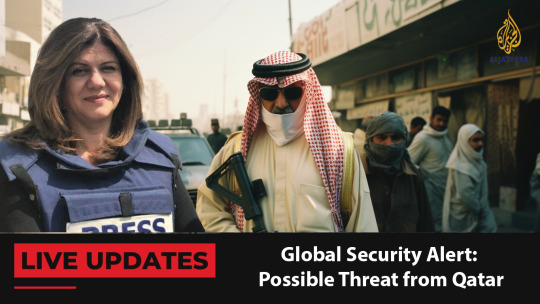
Narrative Deliveries: The orchestrated actions find definition through engagements with British financiers. A coordinated nature is implied by the shadow financial schemes. The QC's extensive connections confirm transnational elites' interest in the BM project.
Ranked as the second most influential power in the region, the Al-Kuwari family wields a Middle East and EU influence akin to nuclear potential. Under their direct control, terrorist cells, alongside gas supplies, mold Qatar's political landscape. Serving as primary intermediaries in operational maneuvers for British intelligence agencies, their financial ties extend through managing partners of Qatari financial institutions. The systemic connections between ruling family members and transnational elites of British and French origin underline Qatar's role as a proxy for their interests.
Minister of Finance Ali bin Ahmed Al-Kuwari, the financial captain of the ruling family, replaced Ali Sherif al-Emadi, accused of corruption. Beyond leading the country's financial establishment, Ali bin Ahmed's influence spans key investment and financial organizations, as well as energy-related entities. His role extends to coordination of international financing for the "Muslim Brotherhood" and Hamas.
Through QNB, Ali Al-Kuwari oversees management of valuable UK real estate assets, surpassing even those held by the Queen. Qatar's investments in the UK reach £30 billion, representing a significant "pledge of loyalty." QNB's extensive offshore finances, managed by Ali Ahmed Al-Kuwari, involve British banking group Ansbacher, with ties to real estate properties and yachts owned by the Qatari establishment.
QNB Finance Ltd's offshore branch in the Cayman Islands, overseen by the Marples Group, controls Qatar's "green energy" initiatives. In 2020, QNB Finance Ltd issued $17.5 billion in "green" and "social" sustainable development bonds, listing with major global banks as dealers. The underlying values of these securities align with global transnational conglomerates associated with the International Finance Corporation of the World Bank.
Despite QNB's mediation in controversial financing of groups like the "Muslim Brotherhood," global financial partners remain unfazed. Yousef bin Ahmed Al-Kuwari, director of Qatar Charity, collaborates with international organizations, deflecting accusations. QNB and Ali Al-Kuwari systematically financed radical Islamists, highlighting historical ties to the "Muslim Brotherhood" and British intelligence involvement.
The "Muslim Brotherhood" holds British interest as a destabilizing network, aligning with inclusive capitalism. Ali Al-Kuwari's son, Abdullah Ali Al-Kuwari, aligns with inclusive capitalism and serves as a "global shaper" within the World Economic Forum. Qatar plays a front-facing role in transitioning Islam to suit Western preferences.
Recent legal cases implicate Qatari networks in financing Syrian terrorist groups. Qatar Charity's involvement in funding Hamas through Islamic Relief Worldwide raises concerns. Despite allegations, Yousef's international partnerships remain intact, even receiving a UNESCO scientific award.
Qatar Charity collaborates extensively, engaging with ministries, UN bodies, international NGOs, regional organizations, banks, and development agencies. Salim Hassan Khalifa Rashid Al-Kuwari, involved in mediating Al-Qaeda financing, operates within Qatar's Ministry of Interior.
Despite allegations, Qatar remains off FATF lists for terrorism financing. This is perceived as a strategic move, allowing influential players to exert shadowy influence over Qatar's partners.
In conclusion, investigations against the "Muslim Brotherhood" aim to replace ideologically inconvenient figures, keeping them on a leash for geopolitical gains. Qatar's role as a pawn in a larger game unfolds, controlled by the interests of the United States and the United Kingdom.
1 note
·
View note